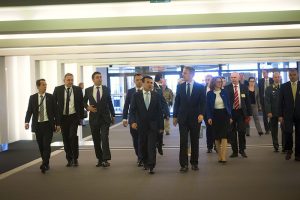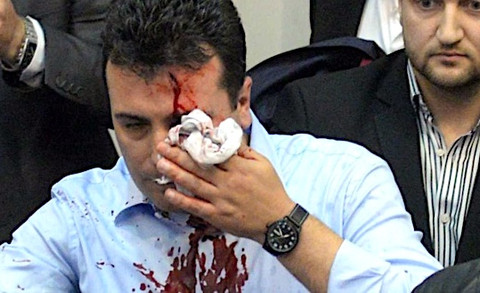
Macedonia is “optimistic” that neither Greek nationalists nor Russia will stop it from shortly joining Nato.
“We believe that we’ve created a good momentum for the final joint steps forward,” on a name dispute with Greece that has dogged its Nato bid, Mile Boshnjakovski, Macedonia’s government spokesman, told EUobserver.
He said Skopje had fostered “the right atmosphere” for a deal and that there was “willingness on both sides” to move forward.
“We don’t expect that this or any other far-right party could harm the process of resolving the name dispute,” Boshnjakovski added, referring to the far-right Anel party in the ruling coalition in Athens.
Greece has blocked Macedonia’s Nato and EU aspirations for a decade on grounds that its name implied a territorial claim to a Greek region of the same name.
If they come to terms, Nato could invite Macedonia to join its Western alliance at a summit in July and the EU could open accession talks after April.
“We expect the Republic of Macedonia to become Nato’s 30th member … our country is creating the conditions for a clear membership invitation,” Boshnjakovski said.
He spoke to EUobserver amid a visit to Skopje on Thursday (1 February) by Matthew Nimetz, a UN mediator on the name dispute.
Boshnjakovski also spoke after the Anel party in Greece rejected the preferred solution – changing Macedonia’s UN name, the Former Yugoslav Republic of Macedonia, to one with a short qualifier, such as New Macedonia or Upper Macedonia.
Anel, which holds the Greek defence ministry, has pressed its line by joining nationalist street protests in Athens.
The Greek party has ties with the ruling United Russia party in Moscow, amid Kremlin opposition to Nato enlargement.
Russia might also get an opportunity to stir nationalist opposition in Skopje if Macedonia holds a referendum on its new name later this year.
Balkan geopolitics
But Boshnjakovski played down the threat of Kremlin interference.
“Bilateral relations between the Republic of Macedonia and the Russian Federation are excellent,” he said.
“We continuously convey the message that the Euro-Atlantic aspirations of the Republic of Macedonia are not and should not be an obstacle for the development of mutual cooperation between Macedonia and Russia,” he added.
For her part, Anna Diamantopoulou, a Greek former EU commissioner, said on Thursday that “Western powers” had put “pressure” on Athens and Skopje to conclude a deal in order to “fend off Russian influence in the Western Balkans”.
Diamantopoulou, the head of Diktio, an NGO, said the threat of Greek “populism-nationalism” was real.
An “overwhelming majority” of Greek MPs backed a composite name, but Greek leader Alexis Tsipras had failed to sell the solution to the Greek public, creating an opening for “political instability”, she said in an opinion article in Greek daily Kathimerini.
The situation in Macedonia was stable, not long after a political crisis there came to a head last year, Boshnjakovski indicated.
Nine months later
The SDSM party of Macedonian prime minister Zoran Zaev is in talks with Besa and DPA, two parties from the country’s ethnic Albanian minority, to restore his parliamentary majority.
The opposition VMRO-DPMNE party of former leader Nikola Gruevski is still boycotting parliament over the arrest of six of its MPs for an incident last April, when a pro-Gruevski mob stormed the parliament building and beat up Zaev.
But Boshnjakovski told EUobserver that “nearly nine months since the incident occurred” the “international community” once again saw Macedonia as “a normal democratic society with cohesion and strength”.
He said Zaev had built a “national consensus with all the key political entities”, including VMRO-DPMNE, on Macedonia’s Nato objective.
He also said Zaev’s “domestic reform process”, in areas such as oversight of security services and judicial independence, had calmed things down.
“These are the foundations for peace and stability in the region,” Boshnjakovski said.
https://euobserver.com/foreign/140795




